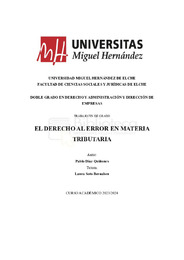Please use this identifier to cite or link to this item:
https://hdl.handle.net/11000/33381Full metadata record
| DC Field | Value | Language |
|---|---|---|
| dc.contributor.advisor | Soto Bernabeu, Laura | - |
| dc.contributor.author | Díaz Quiñones, Pablo | - |
| dc.contributor.other | Departamentos de la UMH::Ciencia Jurídica | es_ES |
| dc.date.accessioned | 2024-10-03T08:24:16Z | - |
| dc.date.available | 2024-10-03T08:24:16Z | - |
| dc.date.created | 2024-06 | - |
| dc.identifier.uri | https://hdl.handle.net/11000/33381 | - |
| dc.description.abstract | El presente Trabajo de Fin de Grado tiene por objeto presentar el denominado “derecho al error” y su posible incorporación en el ordenamiento tributario español como medida tendente a incentivar el cumplimiento voluntario de las obligaciones tributarias. Esta iniciativa surge en un contexto marcado por el cambio de rumbo que está experimentando la relación entre el contribuyente y la Administración tributaria, pasándose de una relación marcada por la confrontación y desconfianza, a una basada en la cooperación. Ante esta nueva tendencia, la Administración tributaria demuestra un esfuerzo continuado dirigido a lograr la mencionada cooperación, llevando a cabo acciones como la constitución de distintos Foros de colaboración, el desarrollo de Códigos de Buenas Prácticas Tributarias, así como otras medidas incentivadoras del cumplimiento voluntario, entre las que debemos destacar los recargos por declaración extemporánea. Es en este contexto donde se han ido produciendo las diferentes propuestas sobre la incorporación del “derecho al error” en el sistema tributario español, medida cuyo origen se encuentra en el ordenamiento jurídico francés y que surge para posibilitar a los contribuyentes que hayan cometido algún error involuntario, consecuencia de las dificultades que afrontan a la hora de cumplir con sus obligaciones tributarias, puedan rectificar sin recibir una sanción por ello, siempre que se cumplan los requisitos exigidos. | es_ES |
| dc.description.abstract | The purpose of this final degree project is to present the so-called “right to tax error” and its possible incorporation into the Spanish tax system as a measure to encourage voluntary compliance with tax obligations. This initiative arises in a context marked by the change in direction that the relationship between the taxpayer and the Tax Administration is experiencing, going from a relationship marked by confrontation and mistrust, to one based on cooperation. Faced with this new trend, the Tax Administration demonstrates a continued effort aimed at achieving the aforementioned cooperation, carrying out actions such as the constitution of different collaboration Forums, the development of Codes of Good Tax Practices, as well as other measures that encourage voluntary compliance, among which we must highlight the extemporaneous declaration tax surcharges. It is in this context where the different proposals have been produced regarding the incorporation of the “right to error” in the Spanish tax system, a measure whose origin is found in the French legal system, which arises to enable taxpayers who have made a mistake involuntary, as a result of the difficulties they face when complying with their tax obligations, to rectify without receiving a penalty for it, as long as the required requirements are met. | es_ES |
| dc.format | application/pdf | es_ES |
| dc.format.extent | 43 | es_ES |
| dc.language.iso | spa | es_ES |
| dc.publisher | Universidad Miguel Hernández de Elche | es_ES |
| dc.rights | info:eu-repo/semantics/openAccess | es_ES |
| dc.rights.uri | http://creativecommons.org/licenses/by-nc-nd/4.0/ | * |
| dc.subject | Administración tributaria | es_ES |
| dc.subject | cumplimiento voluntario | es_ES |
| dc.subject | derecho al error | es_ES |
| dc.subject | materia tributaria | es_ES |
| dc.subject | relación cooperativa | es_ES |
| dc.subject.other | CDU::3 - Ciencias sociales | es_ES |
| dc.title | El derecho al error en materia tributaria | es_ES |
| dc.type | info:eu-repo/semantics/bachelorThesis | es_ES |

View/Open:
TFG DERECHO - Pablo Díaz Quiñones.pdf
937,41 kB
Adobe PDF
Share:
.png)
